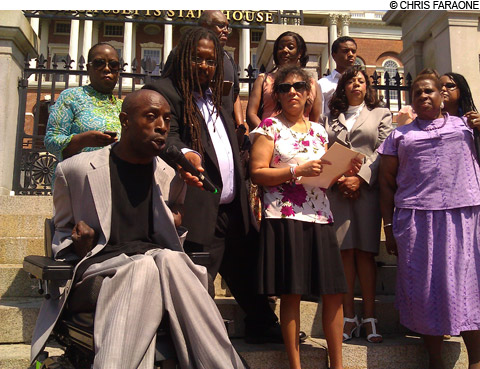
DROPPING BOMBS After being snubbed by the Urban League, advocates for disabled minorities
gathered near the State House to demand a seat at the table. |
Boston burned last week, with pandemonium blazing from Beacon Hill to Dorchester's foreclosed ghettos. Union flags were flown, loud music roared, and fleets of motorcycles rumbled, as several thousand people marched for civil rights and human dignity, and, in at least one case, to scold moguls for banking gross salaries at the expense of workers.
>> SLIDESHOW: Protests of Fox News and Verizon <<
According to the Cambridge-based National Bureau of Economic Research, which determines when recessions start and end, the meltdown that began in 2007 cooled off last year. But despite that rosy reassurance, the unemployment rate has hovered at around nine percent for 28 months, and is showing no real sign of recovery. Just this past week, Wall Street suffered its biggest drop since the peak of economic wreckage three years ago.
To worsen matters, the recent debt-ceiling quagmire reminded Americans that they're governed by a callous brood of bozos. If there was ever faith — on the left or the right — that either Barack Obama or the Tea Party would steer us onto a more comfortable course, it's flown the way of the bald eagle.
Boston feels the pain. In addition to an awful rash of violence — 159 shootings and 34 homicides so far this year — vacant storefronts and suspended building projects add insult to tragedy. There have been small victories; last week, for example, the perpetual protest group City Life/Vida Urbana, along with more than 100 picketers, stalled an eviction on Normandy Street near Franklin Park. But this is a long war, with countless theaters and no apparent end. Here's a view from the front lines.
MINORITY MINORITY REPORT
Two weeks ago, the Urban League of Eastern Massachusetts hosted its national organization's annual conference in the Hub, generating much fanfare and a 42-page document titled The State of Black Boston. The report covered a gamut of critical issues, from education and development to media and culture, but omitted at least one significant topic: blacks with disabilities, and their alarming unemployment rate.
With that snub in mind, last week, seasoned rally-goers from the Union of Minority Neighborhoods (UMN) joined disabled organizers on Beacon Street, where the unified front sparked an overdue dialogue about the welfare of Boston's most marginalized citizens. While the press turnout was abysmal, the crowd eventually grew to more than 40 people, with a few influential leaders — including South End state representative Byron Rushing — showing up to lend support. Animated activists like Toni Saunders, executive director of the Dudley Square–based Associated Advocacy Center, lured in passers-by with passionate pleas.
"Our children are dying," said Saunders. "They're being bullied and excluded, they're drugged, and in some cases, they're committing suicide." Florette Willis of the Roxbury mental-health advocacy group M-Power kicked it up a notch, comparing modern disability apartheid to the foulest institution of all: "Before I be a slave," she declared, "I be buried in my grave."